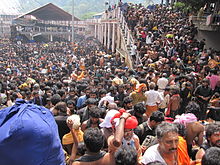This is an old revision of this page, as edited by 183.82.100.192 (talk) at 14:44, 31 December 2014 (→Further reading). The present address (URL) is a permanent link to this revision, which may differ significantly from the current revision.
Revision as of 14:44, 31 December 2014 by 183.82.100.192 (talk) (→Further reading)(diff) ← Previous revision | Latest revision (diff) | Newer revision → (diff)| The neutrality of this article is disputed. Relevant discussion may be found on the talk page. Please do not remove this message until conditions to do so are met. (December 2011) (Learn how and when to remove this message) |
Makara (Template:Lang-sa) is the name of a zodiac sign in Indian languages known as Capricorn in English. "Jyoti" means "light" in Sanskrit. Thus "Makara Jyoti" (also spelt as Jyothi) means "Light of Capricorn".
The Sun appears to move from one zodiac constellation to another every month and the day on which Sun changes the constellation is called Sankrānti (= transit) in Sanskrit. Makara Sankranti (Template:Lang-sa, Template:Lang-ml, Template:Lang-kn, Template:Lang-ta, Template:Lang-te ) is the Sun’s transit into Capricorn (Makara) constellation that usually occurs on 14 January every year and is a very important Hindu festival celebrated all over India in various forms. Uttarāyaṇa, the six-month period when the sun travels towards the north on the celestial sphere starts on Makara Sankranti and ends on Karka Sankranti (around July 14).
One of the places where a large number of devout Hindus reach on 14 January for worship is Sabarimala located in thick rain forests of Kerala.
Makara Jyothi is a star which is worshiped by pilgrims in huge numbers at Sabarimala Temple in Kerala on Makara Sankranti on 14 January every year. However many devout Hindus claim that Makara Jyothi is the celestial lighting which takes place on Makara Sankranthi day and they believe that Lord Ayyappan asserts himself as Makara Jyothi to bless his devotees.
Note : Makara Jyoti is not to be mistaken to Makara Vilakku. Makaravilakku is a light or flame that appears thrice on the Ponnambalamedu hill, four km away to the temple.
Popularity of the Ritual
Lord Sri Rama and his brother Lakshmana met Sabari, an ardent devotee, at Sabarimala. Sabari offered the Lord fruits after tasting them. But the Lord accepted them gladly and whole-heartedly. The Lord then turned and saw a divine person doing tapas. He asked Sabari who it was. Sabari said it was Sasta. Rama walked towards Sasta and the latter stood up to welcome the Prince of Ayodhya. The anniversary of this incident is celebrated on Makara Vilakku day. It is believed that on Makara Vilakku day, Lord Dharmasasta stops his tapas to bless his devotees.
The most famous Ayyappa shrine in India is the one at Sabarimala with over 50 million devotees visiting it every year..
The huge crowd of pilgrims that witnesses the event has been on the rise every year. It is believed that 1.5 million devotees witnessed Makarajyoti light in 2010. The revenue collection during the Makaravilakku period was also higher compared to previous years. The total donations were Rs.720 million in 2008 against previous year’s Rs.723 million.
Sabarimala stampedes and Authenticity Debate

In 1999 and 2011, two major human stampedes occurred on 14 January, Makara Jyothi Day at Sabarimala, killing 53 and 106 people respectively. . In 1999 the Justice T Chandrasekhara Menon committee that investigated the stampede refrained from going into the details of authenticity of 'Makara Jyothi'. Committee stated that Marakajyothi is a matter of belief and can't be probed. Justice Chanadrasekhara Menon had probed the veracity of makarajyothi during that time. He also appointed an advocate of the commission to witness the makarajyothi.
In 2011 another human stampede occurred on 14 January, Makara Jyothi Day at Sabarimal. It broke out during an annual pilgrimage, killing 106 pilgrims and injuring about 100 more. Amid a renewed debate after this stampede, Kerala High Court wanted to know whether or not the ‘Makarajyothi' is a man-made phenomenon, asking about the authenticity of the hallowed celestial light visible from Sabarimala. “A distinction has to be made between the Makaravilakku and Makara Jyothi. The Jyothi is a celestial star. Makarvilakku is lit ,' said the head of the Thazamon Thanthri family, Kantararu Maheswararu. After this Travancore Devaswom Board (TDB) said that it was known to most believers that it was a man lit-fire, but there was a Hindu belief behind it. "It is known to everybody that Makara Jyothi is a fire lit up by men at Ponnabalamedu and TDB also recognises this', TDB President M Rajagoplan Nair told reporters on Jan 31, 2011.
References
- "Sighting of `Makarajothi' brings good luck and blessings". Chennai, India: The Hindu Online. January 14, 2006.
- "Pilgrims witness Makara Jyothi". Manorama Online.
- "Sighting of `Magharajothi' brings good luck and blessings". Chennai, India: The Hindu Online. January 15, 2010.
- ^ "Makarajyothi: Court intervening after 11 years". Mathrubhumi English. 21 Jan 2011. Retrieved 2014-01-18.
- ^ "Sabarimala's Makara Jyothi is man-lit: TDB". Times Of India. 2011-01-31. Retrieved 2014-01-18.
- G. Mahadevan (2011-01-15). "Sabarimala stampede: toll rises to 102". The Hindu. Retrieved 2014-01-18.
- "Kerala High Court's poser on 'Makarajyothi'". The Hindu. 2011-01-20. Retrieved 2014-01-18.
External links
- The official website of Travancore Devaswom Board
- More mythological detail about Lord Ayyapan
- Clarification of the matter by Minister
- - Media reports on Makara Vilakku/Makara Jyoti
- Sabarimala - The Recurring Tragedy Caused by State-sponsored Superstition
- - Minister G.Sudhakaran on Makara Vilakku / Makara Jyothi
- An amateur experience of makarajyothi
